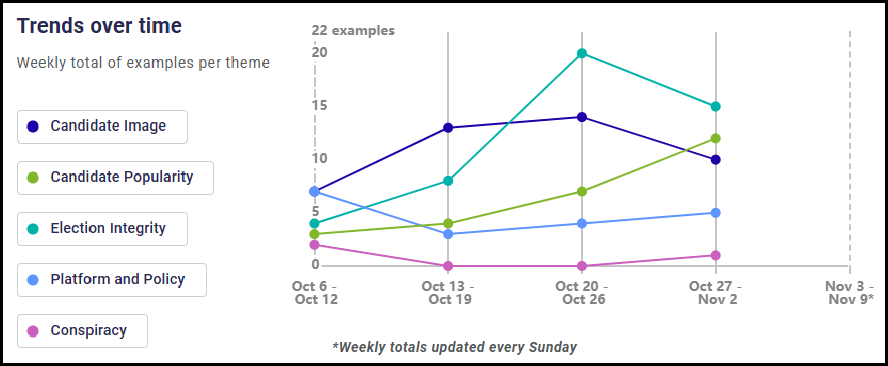
Track the trends: Election integrity targeted by online disinformation
VISIT THE DASHBOARDThe News Literacy Project is tracking presidential election misinformation trends online. As voting day nears, let’s examine some of them, so we can make sure to cast our ballots based on facts, not falsehoods.
A batch of mail-in ballots cast for former President Donald Trump was not destroyed in Bucks County, Pennsylvania; a vacant address in Erie, Pennsylvania is not being used to register illegal voters; and voting machines are not systematically flipping votes in Georgia. The final days of the 2024 presidential election are motivating a spike in falsehoods aimed at undermining confidence in the electoral process in the United States.


Noncitizens Voting
Falsehoods targeting the integrity of elections make up about 15% of all rumors in the News Literacy Project’s Misinformation Dashboard: Election 2024. These false claims have pushed narratives related to election interference, voter interference, and candidate eligibility, and the most common rumor is that noncitizens are illegally casting votes. Yet, as elections experts have repeatedly pointed out — noncitizens aren’t eligible to vote and instances of noncitizens casting a ballot are extraordinarily rare.
Election Night
Another target of election misinformation is the vote counting process itself. While falsehoods misrepresenting how ballots are being tallied already are frequent, this misinformation theme is likely to expand on election night as votes are counted. Here are a few disinformation trends to expect on Nov. 5:
- Surges in votes being misconstrued as fraud. Remember, counties around the country report their totals in batches, not by individual ballots, so it’s normal to see vote totals jump, especially as larger urban counties report their numbers.
- Premature declarations of victory. Some states have laws prohibiting processing mail or absentee ballots until Election Day, making it difficult to announce a winner on election night. Nonetheless, candidates might prematurely declare themselves a winner and call for vote counting to stop. Delays in reporting results are normal, not voting fraud, and it may take days for states to tally results.
- Individual voting glitches misrepresented as widespread fraud. With tens of thousands of polling places across the country, unexpected things can happen. A power outage, a broken machine or a burst water pipe are just a few. Expect any of these kinds of individual anomalies to be weaponized and spread as evidence of cheating or fraud.
NewsLit Tip: False claims often go viral when they evoke an immediate emotional reaction, especially during a high-profile event like Election Day. Remember to slow down, stay skeptical, and check viral claims against credible sources before sharing sensational content online.
For even more disinformation trends, check out our new prebunking guide, a collaboration between the News Literacy Project and the Mental Immunity Project.
Interested in learning more about the methodology we use to collect election-related falsehoods? Visit the Misinformation Dashboard and click on “Where we get our data.” You can also contribute: Use this form to submit a false claim that is not yet in the dashboard.

